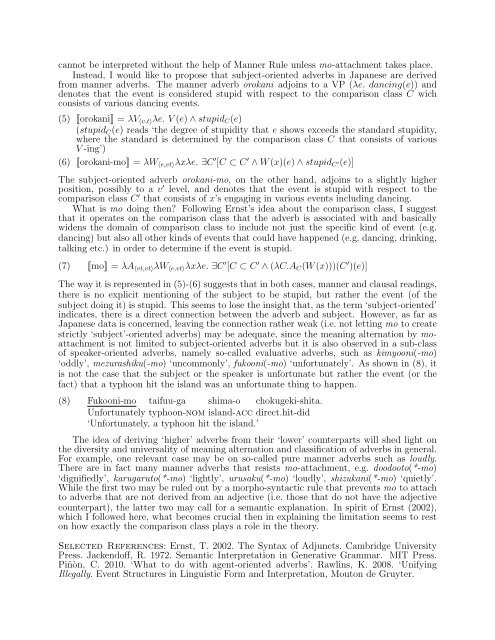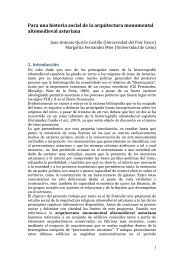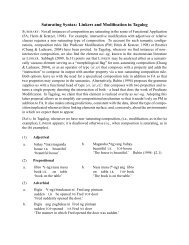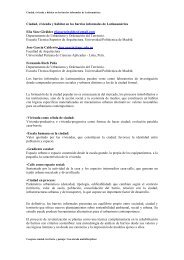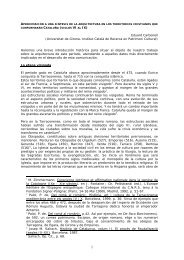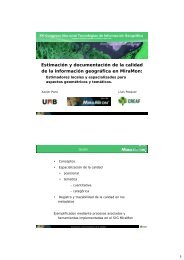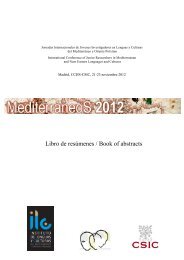Transforming Manner Adverbs into Subject-Oriented Adverbs: An ...
Transforming Manner Adverbs into Subject-Oriented Adverbs: An ...
Transforming Manner Adverbs into Subject-Oriented Adverbs: An ...
You also want an ePaper? Increase the reach of your titles
YUMPU automatically turns print PDFs into web optimized ePapers that Google loves.
cannot be interpreted without the help of <strong>Manner</strong> Rule unless mo-attachment takes place.Instead, I would like to propose that subject-oriented adverbs in Japanese are derivedfrom manner adverbs. The manner adverb orokani adjoins to a VP (λe. dancing(e)) anddenotes that the event is considered stupid with respect to the comparison class C wichconsists of various dancing events.(5) orokani = λV 〈v,t〉 λe. V (e) ∧ stupid C (e)(stupid C (e) reads ‘the degree of stupidity that e shows exceeds the standard stupidity,where the standard is determined by the comparison class C that consists of variousV -ing’)(6) orokani-mo = λW 〈e,vt〉 λxλe. ∃C ′ [C ⊂ C ′ ∧ W (x)(e) ∧ stupid C ′(e)]The subject-oriented adverb orokani-mo, on the other hand, adjoins to a slightly higherposition, possibly to a v ′ level, and denotes that the event is stupid with respect to thecomparison class C ′ that consists of x’s engaging in various events including dancing.What is mo doing then? Following Ernst’s idea about the comparison class, I suggestthat it operates on the comparison class that the adverb is associated with and basicallywidens the domain of comparison class to include not just the specific kind of event (e.g.dancing) but also all other kinds of events that could have happened (e.g. dancing, drinking,talking etc.) in order to determine if the event is stupid.(7) mo = λA 〈vt,vt〉 λW 〈e,vt〉 λxλe. ∃C ′ [C ⊂ C ′ ∧ (λC.A C (W (x)))(C ′ )(e)]The way it is represented in (5)-(6) suggests that in both cases, manner and clausal readings,there is no explicit mentioning of the subject to be stupid, but rather the event (of thesubject doing it) is stupid. This seems to lose the insight that, as the term ‘subject-oriented’indicates, there is a direct connection between the adverb and subject. However, as far asJapanese data is concerned, leaving the connection rather weak (i.e. not letting mo to createstrictly ‘subject’-oriented adverbs) may be adequate, since the meaning alternation by moattachmentis not limited to subject-oriented adverbs but it is also observed in a sub-classof speaker-oriented adverbs, namely so-called evaluative adverbs, such as kimyooni(-mo)‘oddly’, mezurashiku(-mo) ‘uncommonly’, fukooni(-mo) ‘unfortunately’. As shown in (8), itis not the case that the subject or the speaker is unfortunate but rather the event (or thefact) that a typhoon hit the island was an unfortunate thing to happen.(8) Fukooni-mo taifuu-ga shima-o chokugeki-shita.Unfortunately typhoon-nom island-acc direct.hit-did‘Unfortunately, a typhoon hit the island.’The idea of deriving ‘higher’ adverbs from their ‘lower’ counterparts will shed light onthe diversity and universality of meaning alternation and classification of adverbs in general.For example, one relevant case may be on so-called pure manner adverbs such as loudly.There are in fact many manner adverbs that resists mo-attachment, e.g. doodooto(*-mo)‘dignifiedly’, karugaruto(*-mo) ‘lightly’, urusaku(*-mo) ‘loudly’, shizukani(*-mo) ‘quietly’.While the first two may be ruled out by a morpho-syntactic rule that prevents mo to attachto adverbs that are not derived from an adjective (i.e. those that do not have the adjectivecounterpart), the latter two may call for a semantic explanation. In spirit of Ernst (2002),which I followed here, what becomes crucial then in explaining the limitation seems to reston how exactly the comparison class plays a role in the theory.Selected References: Ernst, T. 2002. The Syntax of Adjuncts. Cambridge UniversityPress. Jackendoff, R. 1972. Semantic Interpretation in Generative Grammar. MIT Press.Piñòn, C. 2010. ‘What to do with agent-oriented adverbs’. Rawlins, K. 2008. ‘UnifyingIllegally. Event Structures in Linguistic Form and Interpretation, Mouton de Gruyter.


